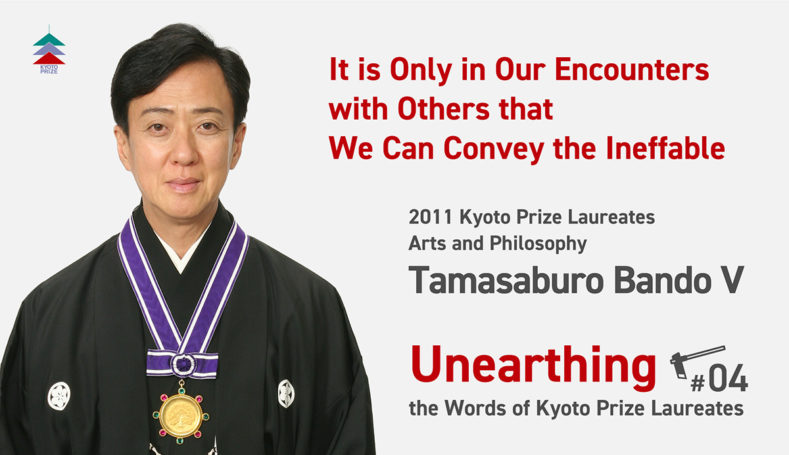
An international award of Japanese origin, the Kyoto Prize is presented to individuals who have made significant contributions in the fields of science and technology, as well as arts and philosophy. Kyoto Prize laureates are those who have made an extra effort to plumb the depths of their chosen fields and profoundly inspired the scientific, cultural, and spiritual betterment of humankind through their achievements. In this series of “Unearthing the Words of Kyoto Prize Laureates,” we will interview the past laureates of the Kyoto Prize and take a closer look at the words that they delivered at their Commemorative Lectures to get to the heart of their unique ideas, thought process, and attitudes as inquirers. In this installment of the series, we had the pleasure of interviewing Tamasaburo Bando V, the 2011 Kyoto Prize laureate in the Arts and Philosophy category.
Previous article in “Unearthing the Words of Kyoto Prize Laureates”
#1 Dr. Toyoki KunitakeYou’re Sure to Find a Breakthrough in the Process of Going Back and Forth Between “Abstraction” and “Materialization”
#2 Dr. Takashi Mimura“Being of Service” Means to Be Needed and Appreciated by the Overwhelming Majority
#3 Dr. Takeo KanadeThe Habit of Returning to the Question “Why am I Doing This Research?” Is the Key to Reaching the Essence
──────────────
Tamasaburo Bando V
Kabuki actor, film director, stage producer. Born in Tokyo. After being adopted by Kanya Morita XIV in 1964, Bando became the fifth actor to take the name Tamasaburo Bando. Thereafter, he came to attention by playing major roles such as Princess Shiranui in Yukio Mishima’s Chinsetsu yumiharizuki (The Moon Like a Drawn Bow) and the title role in Sakurahime Azuma Bunsho (The Scarlet Princess of Edo). He has the honor of being one of the most popular and talented onnagata of his generation. He was awarded the 57th Kikuchi Kan Prize in 2009 and was certified as the Preserver of an Important Intangible Cultural Property (Living National Treasure) in 2012. He received the Medal of Purple Ribbon in 2014. Read more
Nishimura Recently, in an interview with Fujin koron (January 26, 2021 edition; a women’s review magazine published by Chuokoron-Shinsha), you mentioned that during the stay-at-home period in the wake of the beginning of the coronavirus pandemic you had been watching television programs featuring Yuval Noah Harari, a historian known for one of his worldwide bestselling books Sapiens: A Brief History of Humankind, economists and others. What sparked your interest in history and the economy?
Bando I was struck by a series entitled The Capitalism of Desire (NHK’s BS1 Special). Rather than wanting to know about the issues with the coronavirus pandemic, I was more interested in how these researchers and experts saw worldwide trends. From interviews with historians, anthropologists, economists, and others from various countries, I realized that their philosophy was something that I could revisit during the pandemic. Without the stay-at-home period, I doubt I would have had the leisure to pay so much attention to the television. I learned quite a bit.
Nishimura Could you tell us about what science and society have to learn from the performing arts in this era of the coronavirus pandemic? I have heard that you study historical materials and pictures to draw inspiration for your Kabuki performances. Based on your insight into history and culture, what do you think of the contemporary society as it was discussed in the TV program?
Bando I suspect that the ascendancy of GAFA (i.e., Google, Amazon, Facebook, and Apple, the four major US IT corporations) has rapidly changed the way in which people build character over the last decade or so. In the program, it was reported from various perspectives that despite globalization, despite our exchanges of so much information, divisions and disparities were continuing to widen.
For example, even in the wake of bursting of the Bubble Economy after the 1980s, I think we were still in a world in which we had to travel or go sightseeing, by whatever means—we had to head out. Although this had turned the economy around, the coronavirus pandemic brought this movement to a halt. While the economy is likely to become increasingly tough, I feel that the time is soon coming when we will have to reexamine the sentimental ties that are built through person-to-person encounters.
Also, although more and more companies have introduced work-from-home policies in the wake of COVID-19, I assume that we are reaching a saturation point for people connecting with each other online. I think we are realizing that, after all, we can’t sustain our feelings without actually meeting in person, and recognizing again the importance of the mental connections.
Sugimoto I hear that you lived with your teacher at his house from an early age, learning about performance but also studying his every move. What sort of things do you feel that people cannot communicate unless they are together?
Bando When online, the only things we exchange are sounds and characters converted into data. Unless people meet in person, there can’t be a communion of souls. I think that it is important for people to interact with each other at a spiritual level—I believe that is what makes us human. But, in our wisdom, it seems to me that we are gradually moving in the direction of being able to exchange data without having to meet in person. It may be inevitable, since the fact that humans develop technology is something that emerges from a fundamental drive, but I worry that we are being ruled by that technology.
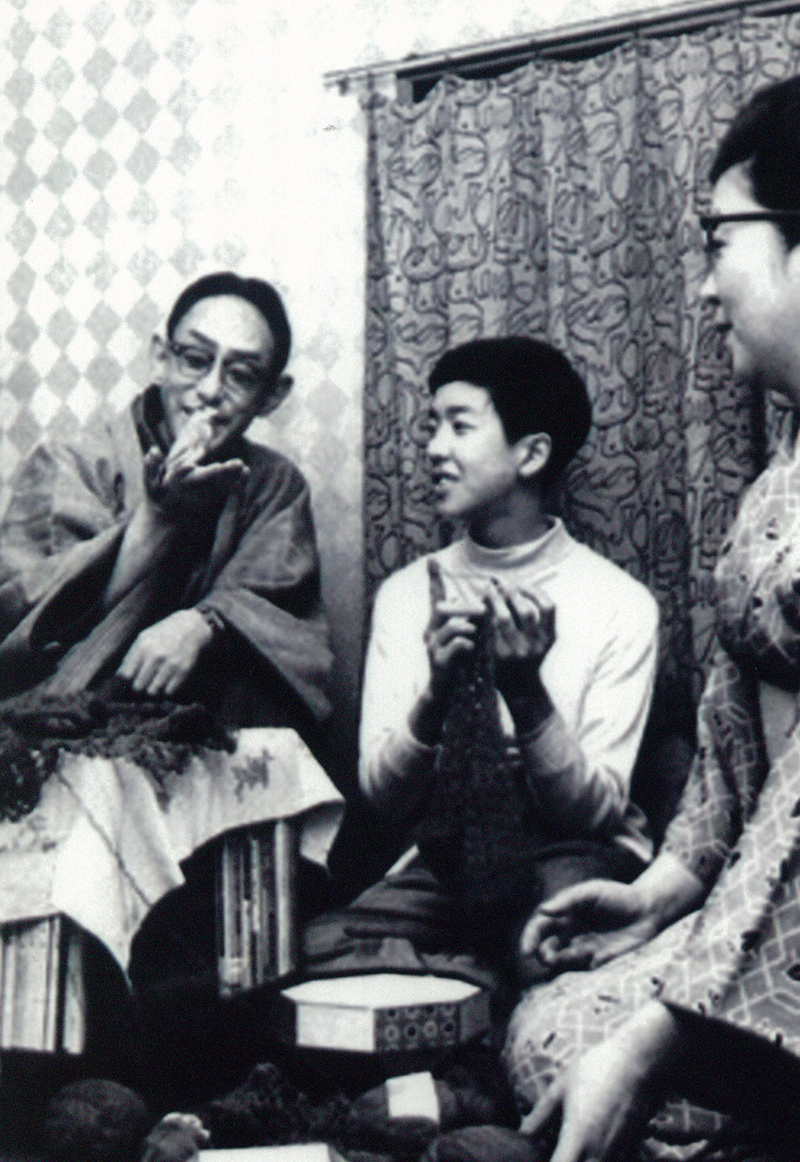
Nishimura So people are able to “convey” information by interacting online, but souls confront and interact with each other by way of their mutual “encounter.”
Bando That encounter, when people come face to face, is with the existence of one another. It’s something you can communicate and feel even if you keep silent. When human beings meet with one another, I feel there is something that can be understood even by way of a resonance that takes place at the cellular level. But with technology, of course, nothing is conveyed without the phenomenon of “data.”
Life meets life, mind meets mind, and bodies face each other directly. But the very fact of being alive is a kind of radiating energy, a kind of thought. For example, even when we close our eyes, other people will still be there. It’s important that we can still get through to each other and warm each other, transmitting and receiving simply by being alive in the same space as each other. Neither the mind nor the soul can be seen with the eyes or touched with the hand. That we’ve been made to think that what we’ve turned into a technological phenomenon constitutes the entirety of our experience as human beings is really problematic, I feel.
Nishimura I want to ask you something from a slightly different angle. My work relates to the sea, which brings me to various islands. There are moments when I look up at the sky and feel an overwhelming sense of beauty. Would you say that this sense of feeling something from an encounter with nature is analogous to what happens in the encounter between human souls?
Bando I think they are a lot alike. No matter how big an image, you cannot get a sense of the sky itself. Of course, a film directed by a famous director may evoke the feeling of the sky, but that comes out of the attempt to express the sky with cuts and other cinematic devices, rather than merely the footage itself.

Even though technology also gives us phenomena that approximate to meeting with others, we do not really encounter these other people, just as you cannot truly see the sky without going to the islands. You know how it works. When you actually meet someone in person, you can tell what kind of person they are simply by seeing them enter the room, sit down, and greet you? Now, we are in a world where we don’t encounter the human soul, the mind, existence, or anything like that. But in the context of this pandemic, I think people are noticing that we’ve reached our limit. I don’t know how many years it will take, but I think we will recapture an age in which people appreciate the mind… I think we’ll be pulled back into it.
Nishimura Assuming there are some things that cannot be conveyed except in person, how can such things be passed down through the ages? Do you feel that this is something that cannot be done by materials like images or text? Or do you think it is something that can be unearthed from such materials?
Bando The materials might be the same, but this is something that will be conveyed to people who live carefully, who appreciate the mind. But unless the sender and receiver live with 99% sincerity, it will end up being nothing more than data. For example, anyone can cook a dish by following a recipe, right? But when a person who has cooked with sincere feeling reads that recipe, that person will understand just how that dish was prepared, and in trying to cook it they will make new discoveries.
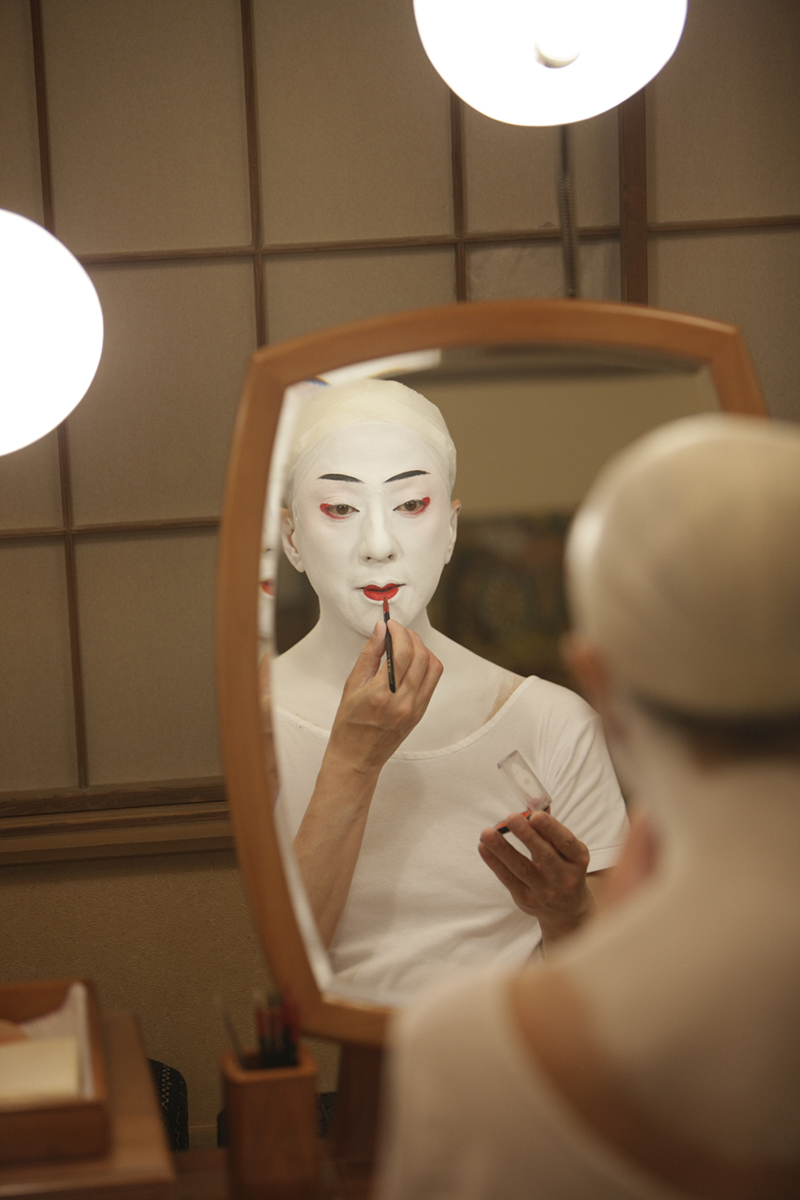
Nishimura Listening to you talk just now, I thought it might be a lot of fun to learn while being an actor. It’s the same with history—perhaps the thoughts of the ancients and watching dramas are all things that can be put to good use when you are performing yourself.
Bando I also really enjoy watching stage performances. Although, I haven’t watched them because I thought they would be useful, but rather because I enjoy them. When you look at the sky or the sea, you wouldn’t think “Maybe I can use this somehow……” Sometimes something that has really moved me comes across in my own work, but that is something that happens unconsciously. I feel that if you are simply trying to make the most of what you have studied, you actually lose something vital.
Sugimoto I’ve heard that for a single performance, you will review a lot of materials and put in an enormous amount of study. At such times, do you feel that your sincere feelings as a recipient help you make a mental connection with the playwright or the thoughts of your predecessors?
Bando When I look at a work that someone of the past crafted with such sincerity, I see the technique and training that went into that work. But what I’m in contact with as I do so is the author’s time and space, the author’s life experience. Perhaps it’s the author’s frame of mind as he composed the play. What takes this in is my own life, the realm of my own soul and mind. You cannot understand what is beyond your own thoughts. And yet, thoughts that lie slumbering within oneself can sometimes be awakened by seeing such works. Unless you touch that work, you will live your life without that feeling ever waking up.
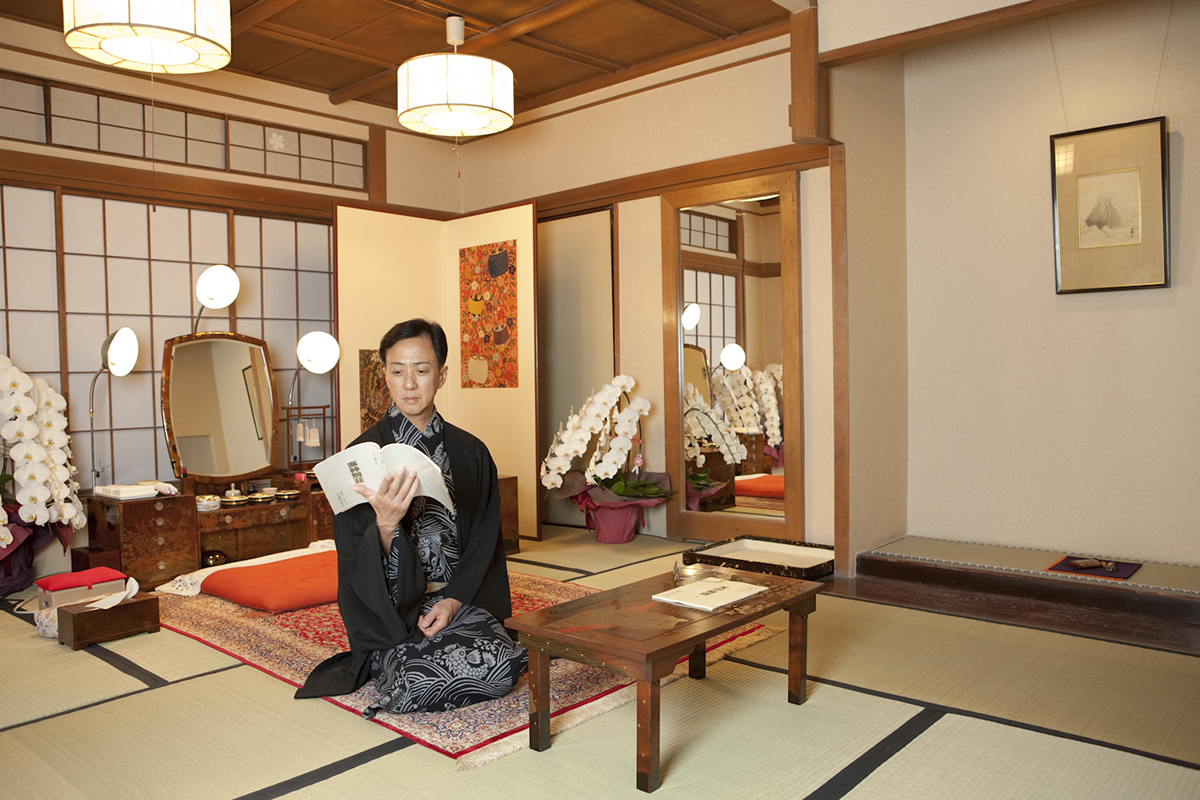
Nishimura In other words, you are saying that correct transmission only takes place when the recipient is correct. So what is transmitted will change completely depending on the kind of person who receives it.
Bando ut just because the recipient changes doesn’t mean that you can change yourself. Matching something to the recipient is like arranging the wrapping paper on a gift without changing what is inside. You just make it more palatable, easier to slip through the entrance, but you don’t change the contents. Even if you change your technique, you won’t change the ideas or the quality of the work.
Nishimura It doesn’t change the work, but rather makes the same work more approachable.
Bando That’s right. And then, if someone tells me to “make it easier to understand,” I’ll say “I can’t.” The answers to life are not found so easily. You could seek answers for the rest of your life without finding them. These days, you can ask a computer for anything, and it will give you an answer. Even so, I feel that it’s really problematic to assume that the answers to life are all to be found on a computer.
Nishimura I feel that it is often the case that a creator’s thoughts will shift in an unintended direction. For example the Englishman Rowland Hill, who is considered to be the father of the modern postal system, devised a system that allowed letters to be sent at a flat rate regardless of distance so that family members and friends living far away would be able to maintain their connections with each other as more people moved away from the countryside to work in London. But communications technology has progressed, and in the age of the Internet, divisions have begun to emerge at the same time as we make “connections.”
Bando When it comes to business, the shape of your initial ideas will sometimes change. Vegetables that have been carefully raised by farmers become “commodities” when they start having to be mass produced. Speaking of farming, I understand that the shortage of young farmers is becoming a problem. On the other hand, there are also many people who say that they can’t find work. I wonder why they don’t consider agriculture. If you think about the idea of putting food on the table, you should be able to make a living in agriculture, with so few people carrying on the profession.
Nishimura If living a life itself is the purpose, you don’t necessarily need to get employed by a company.
Bando It is becoming a problem that people are only concerned about whether they can find a job. I feel that we’ve lost perspective in terms of thinking about how to live. With the coming-of-age ceremony, as well, which should be an occasion to celebrate the spirit of adulthood, it has become more important to wear kimonos and go to parties. We’ve put doing things by the book ahead of appreciating their quintessential meaning.
The same goes for how we spend the end-of-year and New Year holidays. It started long ago in farming villages and small towns with people saying, “Let’s stay up to greet the New Year!” and “Let’s celebrate the New Year!” But now it’s become a ritual event, with people feeling that if they do things a certain way, then they will have successfully celebrated the end of the old year and the start of the new. And even though such ritual event has lost much of its original purpose and meaning while becoming a big business, people are still being made to follow it. And even though such ritual event has lost much of its original purpose and meaning while becoming a big business, people are still being made to follow it.
Nishimura Based on what you’re saying, I get the sense that people who have been born and raised in this era are in an extremely difficult situation, in the sense that all they know is this society that just follows conventions that have already lost their original meaning.. What would you advise for those who are nevertheless looking to take the lead in future? Could you share your thoughts on the place from where they can start afresh?
Bando It’s a very easy thing to say, but I do think it might be better to start from somewhere you can get a solid feel for nature. Nature in the sense of the sky and the sea and the four seasons, as well as human nature. This means that what is important is meeting human beings in the natural environment, not in the virtual environment in which only digital data is exchanged. If people can meet each other face to face, they will sometimes feel ill or get into arguments, but that is really the only way to move forward with life.

Nishimura I see. Do you mean that, for example, it’s like trying to reexamine how much you’ve encountered yourself without the knowledge that you have gotten from books or online?
Bando That’s right. We attain a natural sensibility by engaging often in dialogue with nature. Of course, as human beings, we are burdened with wisdom, and no longer completely natural. But I think that we can try to get back to nature once again.
Sugimoto You were saying that once an activity people begin for some purpose becomes a business, it often changes its initial direction. In the context of theater, I feel that there is a kind of “transmission” that takes place in the direct confrontation between actor and audience. Do you feel that you have been exchanging anything with audiences in your many years on the stage?
Bando A time of pleasure, I suppose. Ultimately, I think the question is whether we can take mutual pleasure in a time and space that lies beyond what is real. It’s a time that is framed by the start and the end of the performance. People cannot remain forever outside the ordinary. Time like this is absolutely necessary, but at the same time it is not like air or water, which everyone needs. Someone will be better off with it, but can live without it.
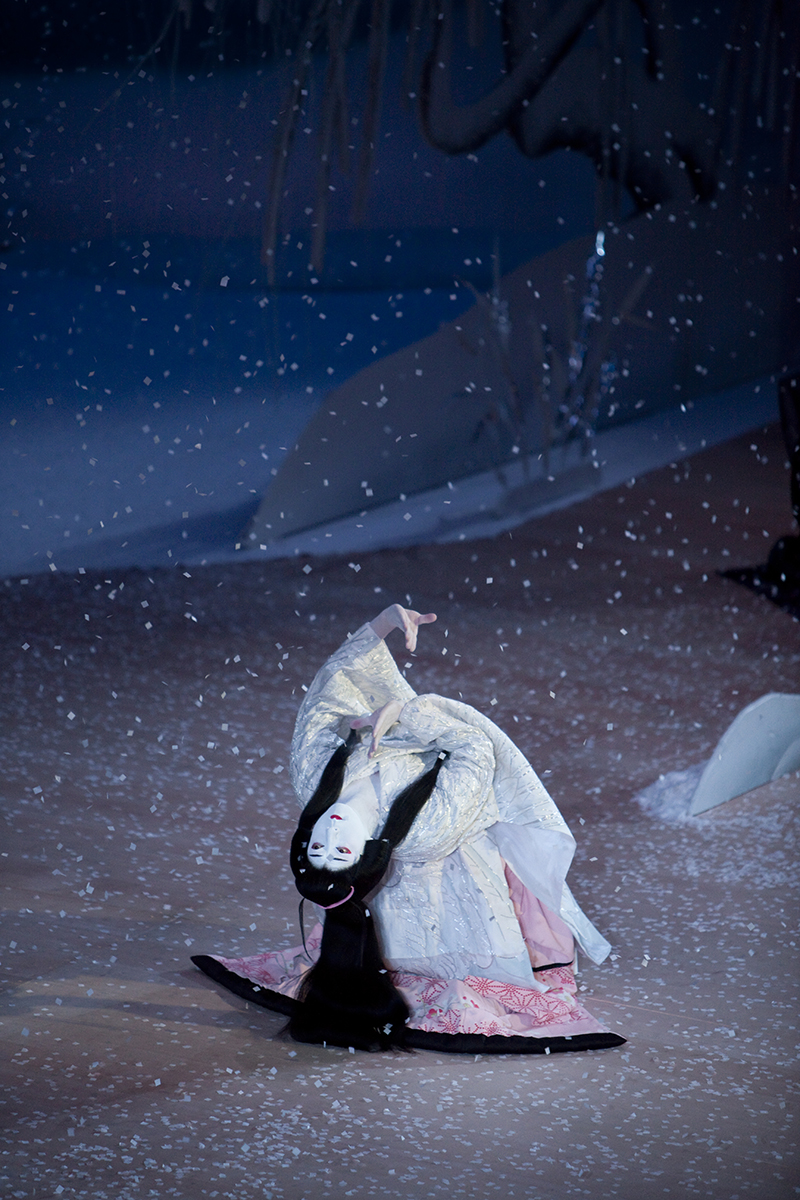
Nishimura Whether or not you need time for theater may depend on how you want to enrich your own life.
Bando Surely it is a richness to be able to appreciate true happiness in each and every moment, from the bottom of your heart. Surely it is a form of wealth to feel contentment at the sight of flowers blooming, or of falling autumn leaves. And though you might own a great building in Manhattan, I doubt that you would feel rich if you were never happy.
Nishimura I think that maybe happiness and wealth lie in the encounter with things that can’t be put into words.
Bando Exactly so. They are ineffable. Even when you are moved by reading something that has been put into words, it may be that what moves you is not the words themselves, but rather your sense of the life of the storyteller.
So when people tell me how wonderful I am on stage and ask me how I am able to express what I do, I can’t put it into words. My theatrical practice will take shape at a certain time and in a certain place. You cannot fully appreciate it unless you are there to see it.
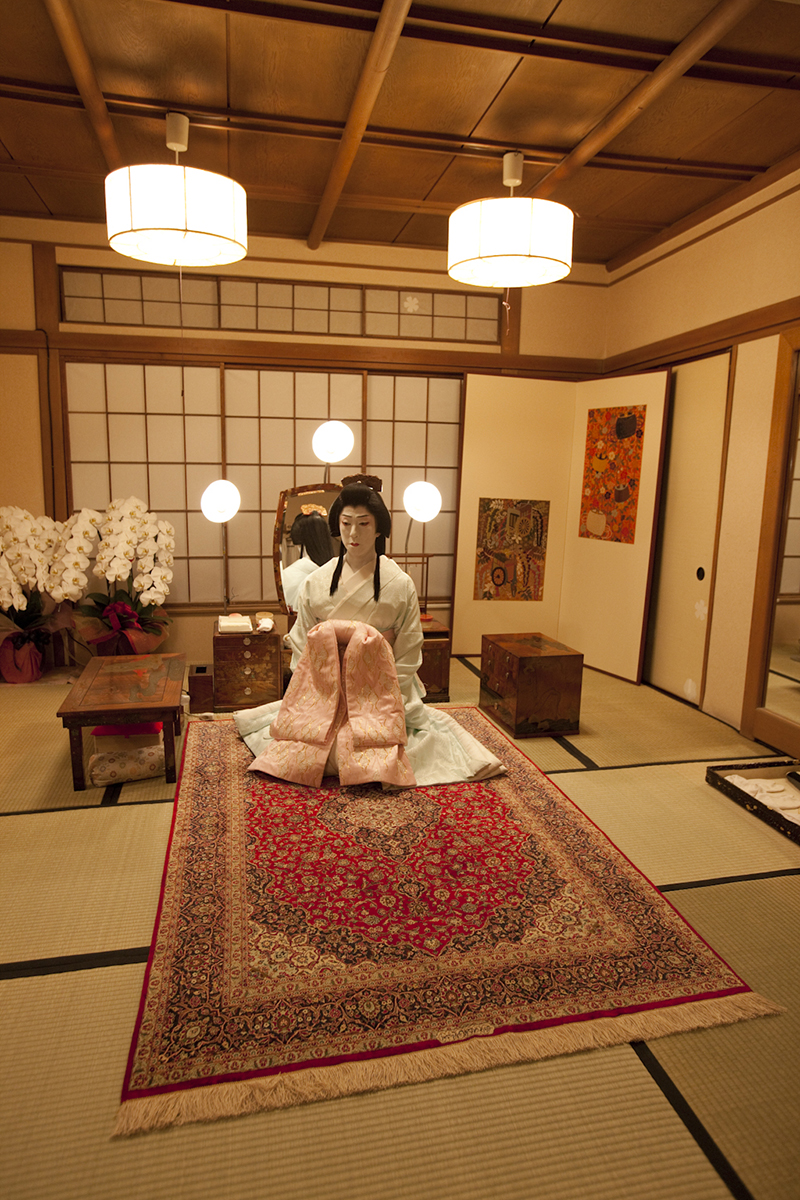
Nishimura To wrap up, I’d like to go back to what you said at the beginning. There are things that cannot be conveyed without meeting people in person, and this is how things can finally be passed on. I wondered whether people living today are able to truly appreciate the importance of things that people have passed on throughout our history.
Bando It may be that the soul has returned to the cosmos, or perhaps it is residing in someone, somewhere—even dwelling in someone on another star. I feel that the body is ephemeral. I believe that the lifespan of the body—even the lifespan of humanity—is but a moment in the cosmos.
Nishimura In an era in which people believe that online interaction is sufficient, I have the sense that we are gradually moving away from the sensibilities that inspire our thoughts toward the cosmos.
Bando You’re so right. In a sense, the true spirit of religion may have been passed down by those who were able to enter into communion with the numinous, with something on the vast scale of the cosmos, by listening to the voice of Heaven.
Nishimura Thinking of the age to come, I feel that we have to recapture an appreciation for pre-linguistic feelings.
Bando If we don’t, there will be no future. Since the 1990s, it’s become mainstream to assume that everything can be expressed in words or data. Hence we have seen the slump in literature and art. But I think that it is only in the face of such harshness that we will be able to recover the things that cannot be put into words.
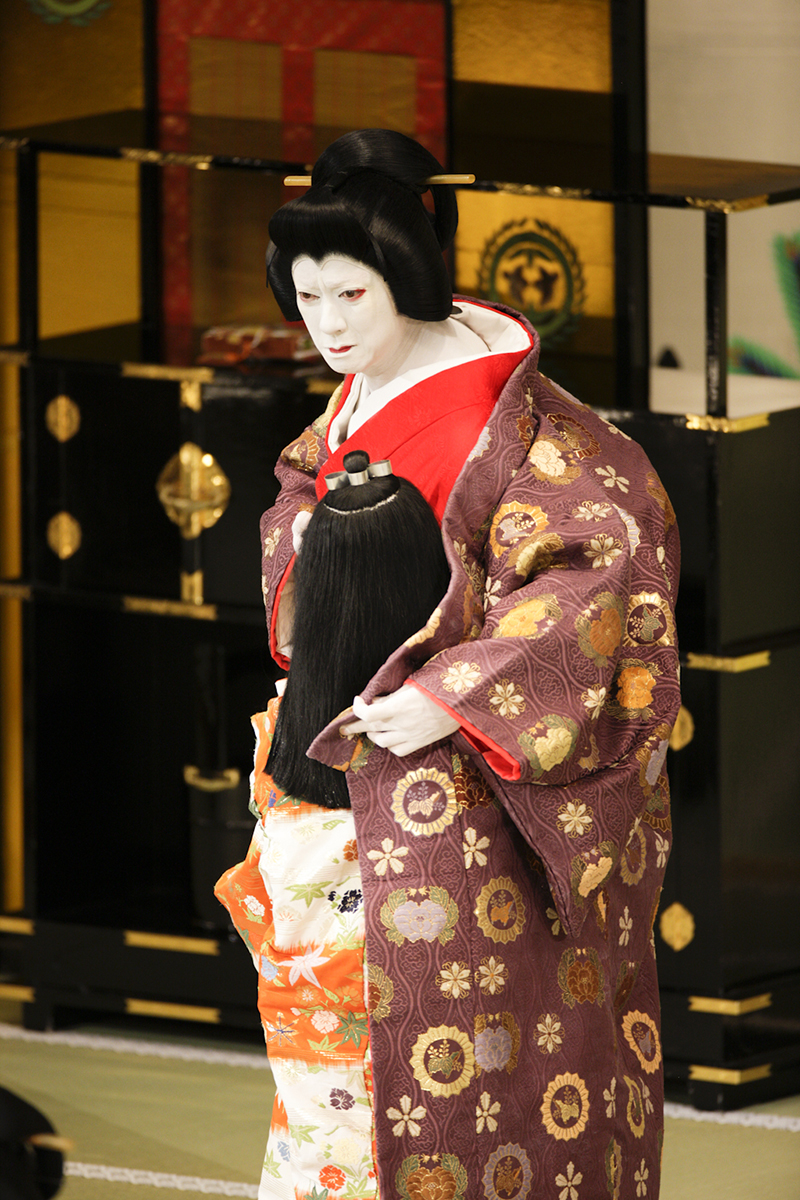
Nishimura I think it will be natural for us to sing and dance when humanity has been able to recover a sense of what is worth appreciating. But in the current context of the coronavirus pandemic, the opportunity for singing and dancing together is something that has been taken from us.
Bando I think you’re right. For example, in our farming days, we would have sung and danced as a festival celebration to bring joy to our souls, an occasion that differed from the daily work of subsistence. Singing and dancing begin from there. I guess that’s why gathering together feels so extraordinary.
Nishimura From their earliest history of collective life, human beings began cultivation as a way of living together in groups. I think that we must be animals that have a pressing need to gather together, or perhaps it’s very natural for us to try to gather together. Moreover, we don’t want to gather in barren spaces—we want to come together for the fun of singing and dancing. Gathering together moves the heart in a way that simply watching video footage cannot.
Bando Those who come to the theater are people who can connect their thoughts to the songs and dances on the stage, even if they do not sing and dance themselves. That is why their hearts leap. I feel that human beings strike a balance between the vitality of living and the vitality of singing and dancing. Just sitting and watching a screen will not move your heart. The human body is made for movement. The human body is made for movement.
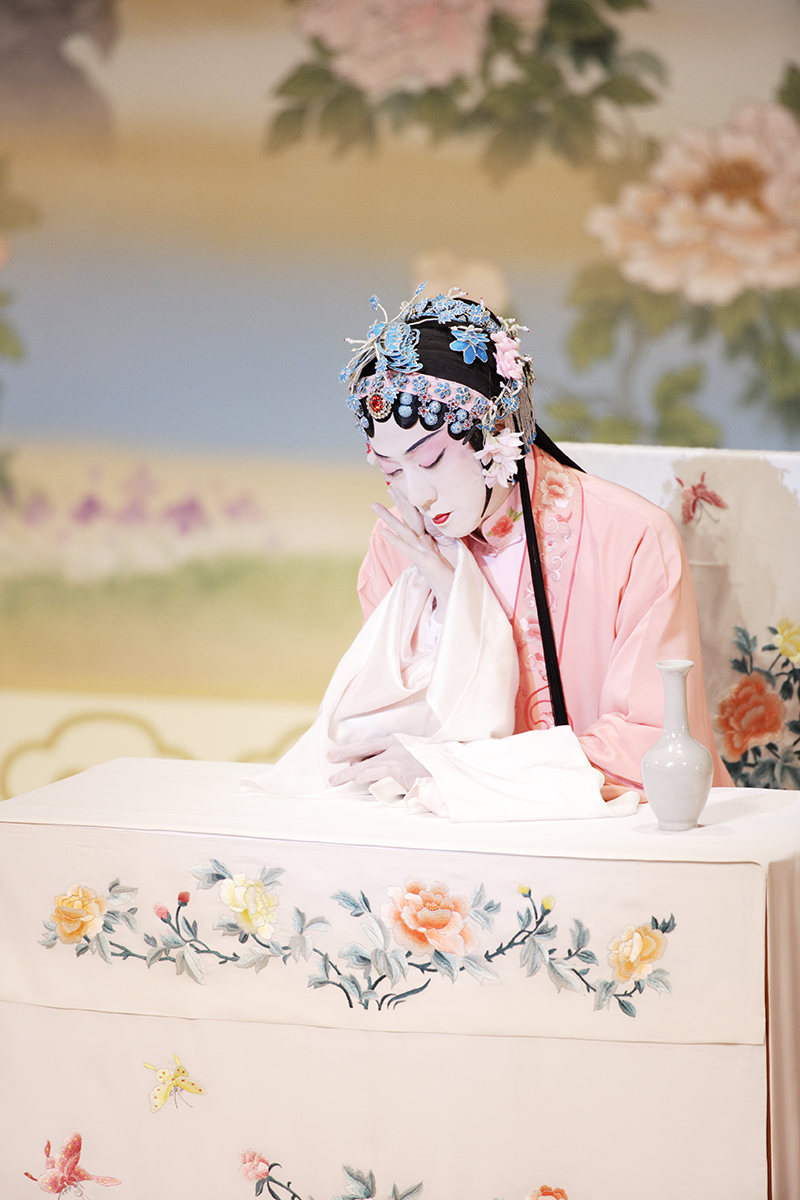
Nishimura There were three things I wanted to ask you about today. At the beginning, I asked about what science and society can learn from the performing arts. The second thing was about the passing on of tradition, and the last concerned the value of the theater. I’m very satisfied on all counts.
Bando Thank you. I am glad to hear that. I’m sorry I couldn’t give you more definitive answers. It’s my process of questioning everything for as long as I live.
Nishimura The pleasure was ours.
Click below to watch the YouTube video of Tamasaburo Bando V’s Commemorative Lecture from 2016.
Previous article in “Unearthing the Words of Kyoto Prize Laureates”
#1 Dr. Toyoki KunitakeYou’re Sure to Find a Breakthrough in the Process of Going Back and Forth Between “Abstraction” and “Materialization”
#2 Dr. Takashi Mimura“Being of Service” Means to Be Needed and Appreciated by the Overwhelming Majority
#3 Dr. Takeo KanadeThe Habit of Returning to the Question “Why am I Doing This Research?” Is the Key to Reaching the Essence
[About the interviewer]
Yuya Nishimura
Executive Director, MIRATUKU. Earned a Master’s Degree from the Osaka University Graduate School of Human Science. Built a cross-sector -business and -domain innovation platform, supports leading companies (about 30 annually) in creating new businesses, assists launch of R&D projects, designs future visions, and searches for future trends. Other positions include Innovation Designer, Innovation Design Office, RIKEN, Japan, and Specially Appointed Associate Professor, Social Solution Initiative (SSI), Osaka University MIRATUKU website
[About the writer]
Kyoko Sugimoto
Freelance writer. Earned a Master Degree in Media, Journalism & Communication, Graduate School of Letters, Doshisha University. Interviews researchers, business managers, Buddhist monks, urban designers on such topics as asylums, communities, and Buddhism. Authored Kyodaiteki Bunka Jiten: Jiyu to Kaosu no Seitaikei (Kyoto University Cultural Encyclopedia: Ecosystem of Freedom and Chaos), Film Art, Inc. writin’room